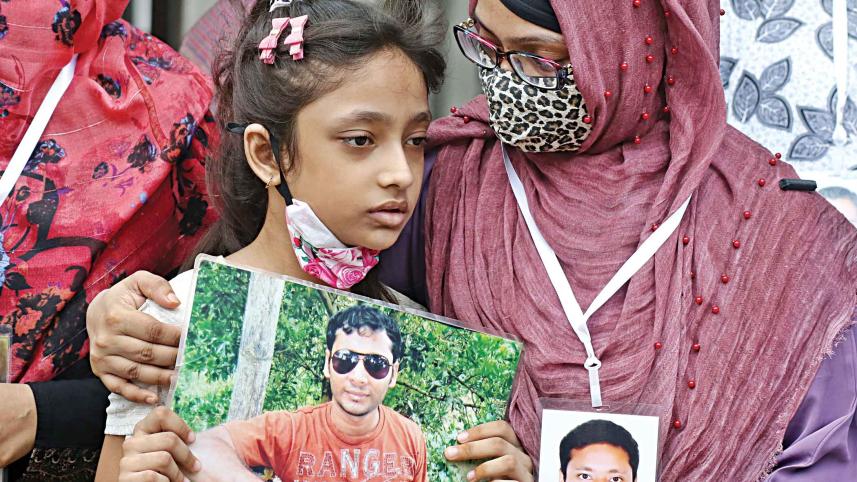Enforced Disappearance: Unchanging pictures, unending wait

For the past five years at least, The Daily Star has been documenting little Adiba Islam Hridi on the streets and in conference rooms, holding a photo of her missing father Parvez Hossain.
Every year, the photo is the same -- Parvez in an orange tee-shirt, sporting aviators and sitting jauntily on a red motorbike. It is the last photo his family has of him.
Parvez, a Jatiyatabadi Chhatra Dal leader from the capital's Bangshal, was picked up from Shahbagh by members of a law enforcement agency on December 2, 2013, claimed his family and friends, who were present when he was taken.
"I have been coming back for the last eight years," Hridi, sitting on the curb in front of the Jatiya Press Club yesterday, told this correspondent.
She was at a human chain organised by "Mayer Daak", a platform of families with members who have been victims of enforced disappearances.
Hridi is now nine years old and a student of class 4. Each year, this newspaper has been watching her get a year older, but making the same demand for whoever had caused her father's disappearance to return him back to her.
"I don't even remember my papa," said Hridi, who would have been less than two when Parvez was picked up.
Hridi is not the only child who has been coming back year after year.
Eleven-year-old Lamia Akhter Mim has also been coming back for the last eight years. Her father Kawsar Hossain, a driver who was 22 when he was picked up allegedly by law enforcers from his house in West Nakhalpara on December 4, 2013.
According to Mayer Daak, Kawsar's mother passed away earlier this year in January, her wish to see her son return unfulfilled.
Similarly, seven-year-old Safa has been coming to these protests every single year of her life. "I was in the womb when my father was taken away," said Safa.
Mosquitoes from the open drain beside her buzzed at her legs, but she sat dutifully on the curb holding a picture of her father Mahfuzur Rahman Sohel, a Chhatra Dal leader in Bangshal.
"My father had gone to buy flowers when they took him away," said Safa. The date was December 2, 2013.
"I know the other children here. I see them each year," she said.
But how long before hope wears thin?
"Last year we got a telephone from Bangshal Police Station [asking us] to withdraw the general diary we had filed. But I have not lost hope. I will withdraw the GD when I find my husband," said Hridi's mother Farzana Akhter.
"We have often seen our loved ones coming back. We cannot lose hope. We have to keep hoping that our family members will be back," said Abrar Ilias, son of Ilias Ali, the BNP leader who went missing on April 18, 2012.
Afroza Islam Akhi, whose brother Sajedul Islam Suman is a victim of enforced disappearance, said, "I have been coming here for the last 13 years. If the government thinks they can silence a person by forcefully disappearing him, it did not understand that that very act gave the rest of the family members the strength to yell louder."
Sajedul Islam Suman, the general secretary of ward-38 of the BNP's Dhaka city unit, was held along with five others in the Bashundhara residential area in Dhaka on December 4, 2013.
Nagorik Oikya convener Mahmudur Rahman Manna said, "Just because someone had a different political ideology doesn't mean he deserves to be forcefully disappeared."



 For all latest news, follow The Daily Star's Google News channel.
For all latest news, follow The Daily Star's Google News channel.
Comments